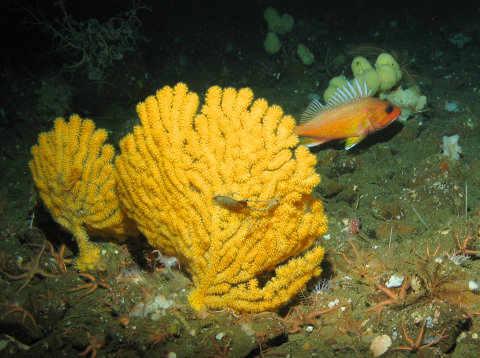WASHINGTON--(BUSINESS WIRE)--Today, NOAA Fisheries issued final regulations to protect more than 140,000 square miles of seafloor habitat off the U.S. West Coast from destructive bottom trawling. Places protected include corals, sponges, rocky reefs and other important areas for marine life and ocean ecosystems. These safeguards for the living seafloor are in response to a vote by the Pacific Fishery Management Council in April 2018 — following years of scientific input and advocacy by Oceana — to more than double the spatial extent of seafloor protections off California, Oregon and Washington from the impacts of bottom trawl fishing gear. Once the new regulations take effect on January 1, 2020, 90 percent of the seafloor in U.S. ocean waters off the West Coast will be off limits to bottom trawling.
Bottom trawling is the most damaging fishing method to seafloor habitats off the West Coast. Weighted nets are dragged to catch fish living near the seafloor and in doing so flatten, topple and crush delicate corals and sponges that provide habitat for these fish and other marine creatures.
The new regulations protect unique and important ocean areas off Washington, Oregon and California. Also included is the protection of deep-sea habitats beyond 3,500 meters depth (nearly 2 miles) below the ocean’s surface from all commercial bottom-contact fishing gear. In addition, the regulations increase fishing opportunities by allowing select re-openings in some historic fishing grounds where bottom trawling has been prohibited in recent years to recover overfished rockfish populations.
Ben Enticknap, Pacific campaign manager and senior scientist with Oceana issued the following statement in response to today’s announcement:
“Today’s decision to protect over 140,000 square miles of seafloor habitat off the U.S. West Coast from bottom trawling is a win-win for ocean conservation and fishermen. Healthy oceans rely on a healthy seafloor and these new conservation areas will ensure that commercially important fish and other ocean animals, like deep-sea corals, octopus, crab and sea stars, can thrive into the future. Coral and sponge gardens are the homes where many deep-sea fish find shelter and sleep, they are the grocery stores where they feed and the nurseries where their young can grow. These new protections establish safe havens for sensitive deep-sea ecosystems where fish populations can flourish at healthy levels to the benefit of our ocean environment and fisheries.”
“Fragile glass sponge reefs, long-lived bamboo coral forests, intricate lace sponges, and newly discovered black corals are among the many living habitats receiving protections. Until recently, these deep-sea areas were unknown to mankind and there’s still so much more about the ocean floor that remains a mystery. In a world of more than seven billion people, there are still new and exciting things to discover about our ocean planet.”
For more information about Oceana’s campaign to protect the living seafloor, please visit www.oceana.org/PacificSeafloor. The following additional resources are also available:
- Take a digital tour of the Pacific Coast seafloor protections here
- View images of deep-sea coral gardens, sponge beds and rocky reefs photographed during Oceana’s seafloor expeditions here
- Download a map of the new and existing essential fish habitat conservation areas here
- Download b-roll video footage of deep sea habitats here
Oceana is the largest international advocacy organization dedicated solely to ocean conservation. Oceana is rebuilding abundant and biodiverse oceans by winning science-based policies in countries that control one third of the world’s wild fish catch. With more than 200 victories that stop overfishing, habitat destruction, pollution and killing of threatened species like turtles and sharks, Oceana’s campaigns are delivering results. A restored ocean means that one billion people can enjoy a healthy seafood meal, every day, forever. Together, we can save the oceans and help feed the world. Visit https://usa.oceana.org/ to learn more.




